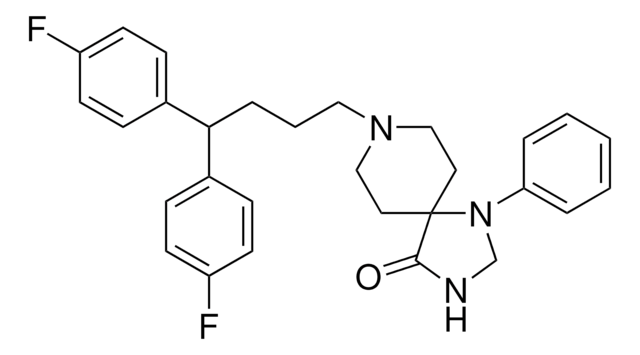I1911
IU1
≥98% (HPLC)
Sinónimos:
1-[1-(4-Fluoro-phenyl)-2,5-dimethyl-1H-pyrrol-3-yl]-2-pyrrolidin-1-yl-ethanone
About This Item
Productos recomendados
Quality Level
assay
≥98% (HPLC)
form
powder
color
off-white to light brown
solubility
DMSO: >10 mg/mL
storage temp.
2-8°C
SMILES string
FC1=CC=C(N2C(C)=CC(C(CN3CCCC3)=O)=C2C)C=C1
InChI
1S/C18H21FN2O/c1-13-11-17(18(22)12-20-9-3-4-10-20)14(2)21(13)16-7-5-15(19)6-8-16/h5-8,11H,3-4,9-10,12H2,1-2H3
InChI key
JUWDSDKJBMFLHE-UHFFFAOYSA-N
Application
Biochem/physiol Actions
Storage Class
11 - Combustible Solids
wgk_germany
WGK 3
Certificados de análisis (COA)
Busque Certificados de análisis (COA) introduciendo el número de lote del producto. Los números de lote se encuentran en la etiqueta del producto después de las palabras «Lot» o «Batch»
¿Ya tiene este producto?
Encuentre la documentación para los productos que ha comprado recientemente en la Biblioteca de documentos.
Nuestro equipo de científicos tiene experiencia en todas las áreas de investigación: Ciencias de la vida, Ciencia de los materiales, Síntesis química, Cromatografía, Analítica y muchas otras.
Póngase en contacto con el Servicio técnico







